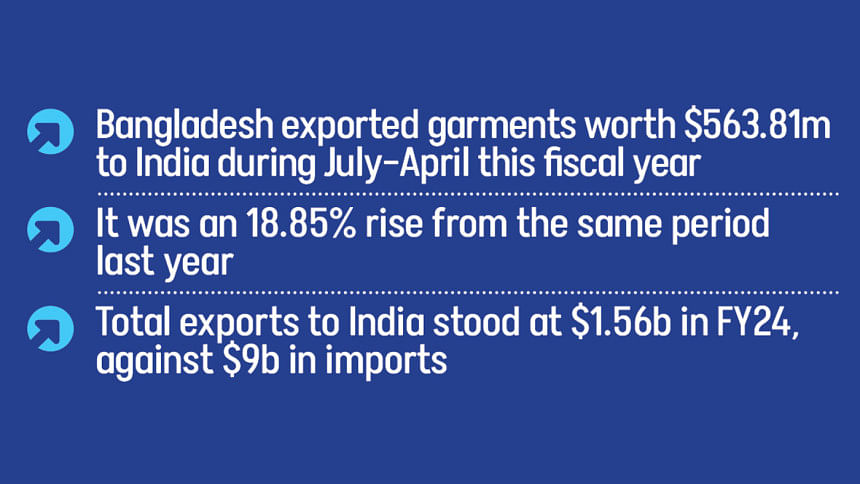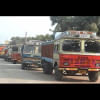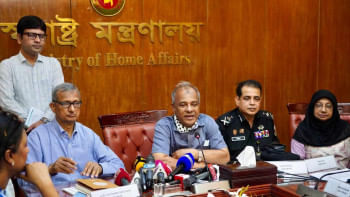Exporters caught off guard by India’s import curbs

Hundreds of trucks carrying India-bound goods were either stuck or forced to leave without offloading goods at several Bangladeshi land ports yesterday.
It happened a day after New Delhi abruptly restricted imports of key products -- most notably garments -- through all but two designated sea ports.
The move, announced by India's Directorate General of Foreign Trade, limits the entry of Bangladeshi garment, processed food, plastic goods, and more through land routes into Assam, Meghalaya, Tripura, Mizoram, and parts of West Bengal. Exporters, caught off guard, now face heavy losses and logistical chaos as their shipments sit idle at ports like Benapole, Burimari, and Banglabandha.
"This sudden decision could severely disrupt bilateral trade," said Emdadul Haque, general secretary of the Benapole C&F Agents Association. At Benapole, at least 36 trucks carrying ready-made garments were stranded yesterday evening.
The port's cargo yard had no work yesterday afternoon.

In Panchagarh, a truck transporting plastic doors from RFL Group was turned away at Banglabandha-Phulbari Land Port. "The Indian authorities informed us that the goods were no longer admissible. We had to recall the truck," said Shubho Kumar Saha, export manager at Pran-RFL Group.
The company currently has 17 trucks laden with processed food worth over $1,00,000 stuck at multiple ports, said Kamruzzaman Kamal, marketing director of Pran-RFL Group.
Garment exporter Energypac Fashions Ltd reported three containers of formal suits and trousers worth over $3,00,000 were stuck at Benapole. Chairman Humayun Rashid, who has been exporting to India for seven years, warned of forced rerouting and mounting losses. He also fears disruption in shipments to Nepal, as some of his consignments transit through India.
In Lalmonirhat's Burimari Land Port, around 80 trucks were stopped.
By evening, at least 36 trucks were stranded. Exporter Shamim Hossain, who trades in garment waste, said, "Seven of my trucks are stuck at Burimari. Ninety percent of my business relies on Indian buyers."
He also said over 100 exporters operate through the Burimari Land Port.
At Akhaura Land Port in Brahmanbaria, trade slowed to a crawl. Only three trucks of frozen fish were allowed into India, said Mahmudul Hasan, assistant director of the port.
The restrictions issued without warning on Saturday night direct that garments -- by far Bangladesh's top export -- must now enter India only through Kolkata or Nhava Sheva sea ports. Other restricted goods include carbonated beverages, processed food, cotton and yarn waste, plastic and plastic products, and furniture.
Although the new rules do not affect fish, LPG, edible oil, or crushed stone exports, they have left garment exporters in a bind. Many had already dispatched goods to land ports before the notification was issued. With no immediate option to reroute, shipments now sit idle, racking up costs.
MA Jabbar, managing director of DBL Group, said some Indian buyers might opt to reroute imports themselves, since they import Bangladeshi products via other countries.
Faruque Hassan, former president of the Bangladesh Garment Manufacturers and Exporters Association, warned that the restrictions could undercut years of progress in building India as a major market. "We supply to both local Indian brands and global labels like M&S and H&M through India. Limiting port access will hamper business," he said.
Exporters say land routes are not just cost-effective but essential. "Shipping via sea ports like Nhava Sheva is expensive and time-consuming," said Al Mamun, an exporter.
"Now we are in deep trouble," he said.
According to the Export Promotion Bureau, Bangladesh exported $563.81 million worth of garments to India in July–April of the current fiscal year, an 18.85 percent rise from the same period last year. Total exports to India stood at $1.56 billion in FY24, against $9 billion in imports.
Commerce Secretary Mahbubur Rahman said the government is engaging with Indian authorities over the issue but declined to elaborate.
Commerce Adviser Sk Bashir Uddin said the government has initiated a preliminary review to determine the steps Bangladesh should consider.
"Our products are exported mainly due to their competitive pricing. We hope this competitiveness will continue to benefit consumers and businesses in both countries," he said.
The latest restrictions follow Delhi's decision in April to suspend transhipment facilities for Bangladeshi cargo bound for third countries via Indian land borders, triggering concerns over tightening trade conditions.
However, the adviser said, "This is not a continuation of the transhipment issue. Indian traders will also feel the impact of this move. Given our geographical proximity, both countries remain interdependent."
Deputy Director Mamun Tarofder of Burimari Land Port said after failing to enter India, many trucks left the port. At least 36 trucks remained stranded yesterday evening.
Mehedi Hasan, assistant director of the Bangladesh Land Port Authority at Burimari, told The Daily Star that around 200 to 250 trucks pass through the port to India and Bhutan daily.
The trucks bound for Bhutan crossed the border as usual, said Humayun Sawdagar, an exporter.
"Many of us regularly export garments and food items to India through this port. Such sudden restrictions will put us in great trouble," he said.
Not only the exporters, livelihoods of hundreds of people involved in loading-unloading of goods and other activities will be severely affected, he added.
Major portion of the products stuck at the land port are garments and garment waste, according to him.
"We urge the Indian government to withdraw the restrictions immediately," said Motiar Rahman, director of the India-Bangladesh Chamber of Commerce and Industry.
[Our correspondents in Benapole, Lalmonirhat, Thakurgaon, and Brahmanbaria contributed to this report]

 For all latest news, follow The Daily Star's Google News channel.
For all latest news, follow The Daily Star's Google News channel. 





Comments